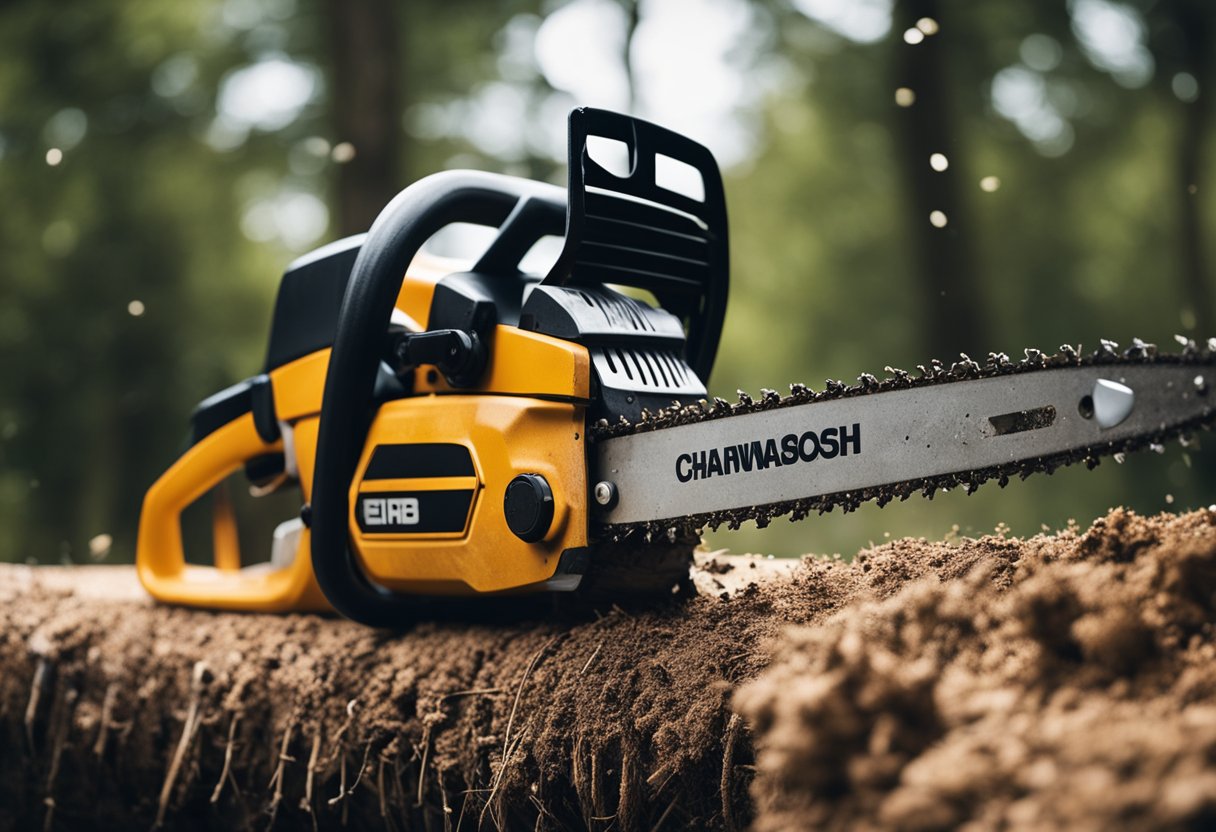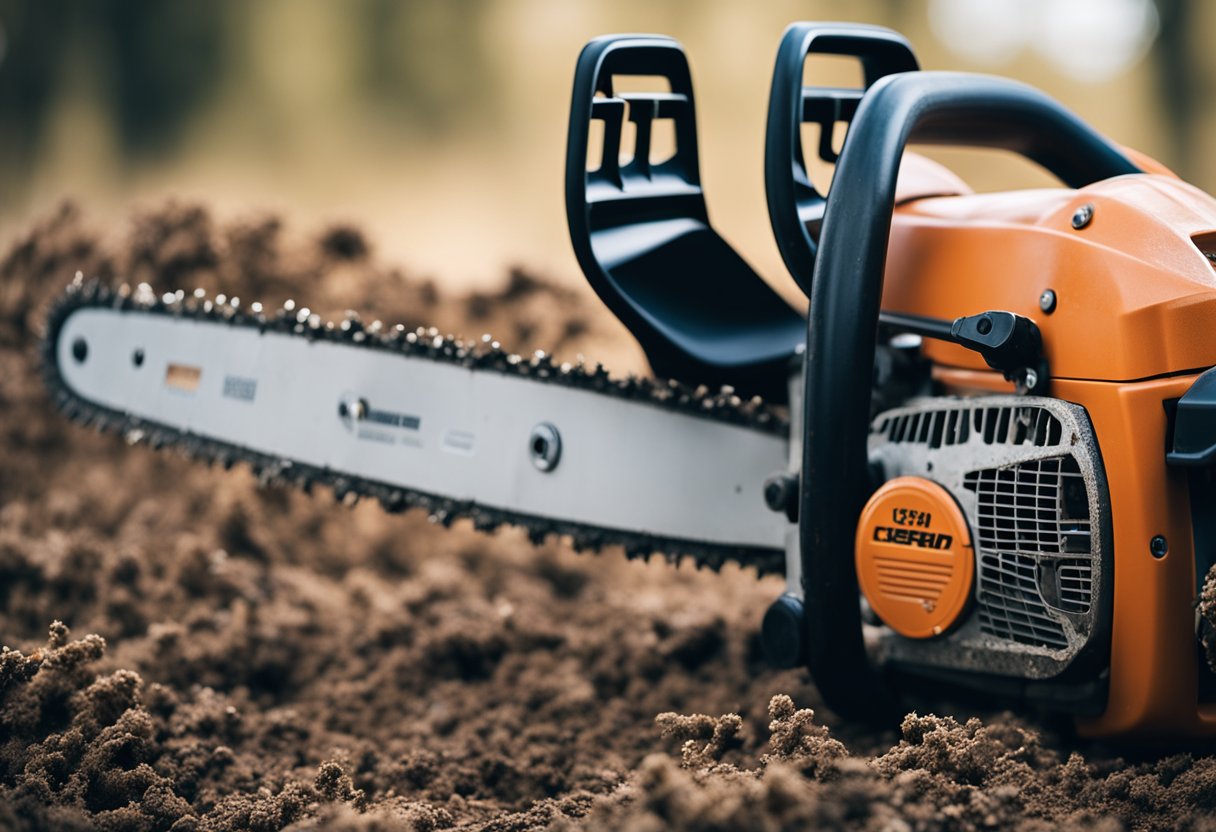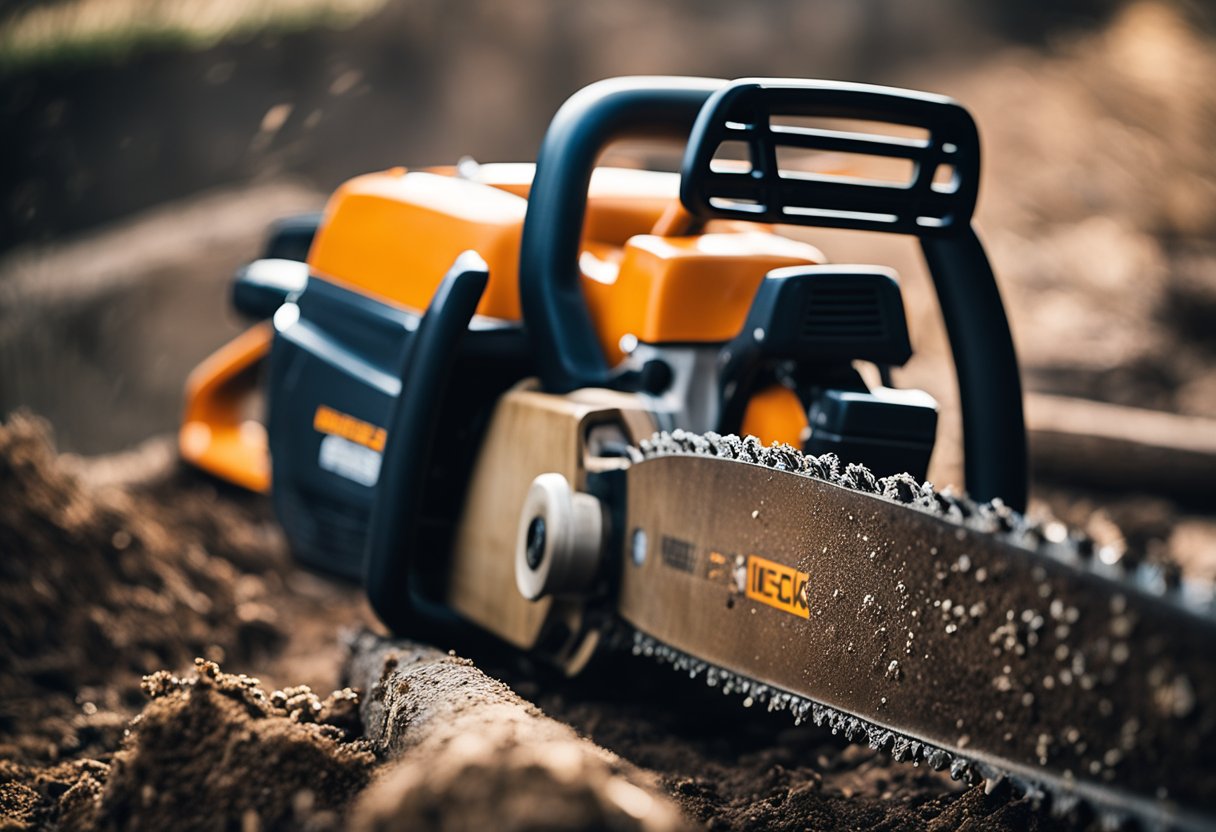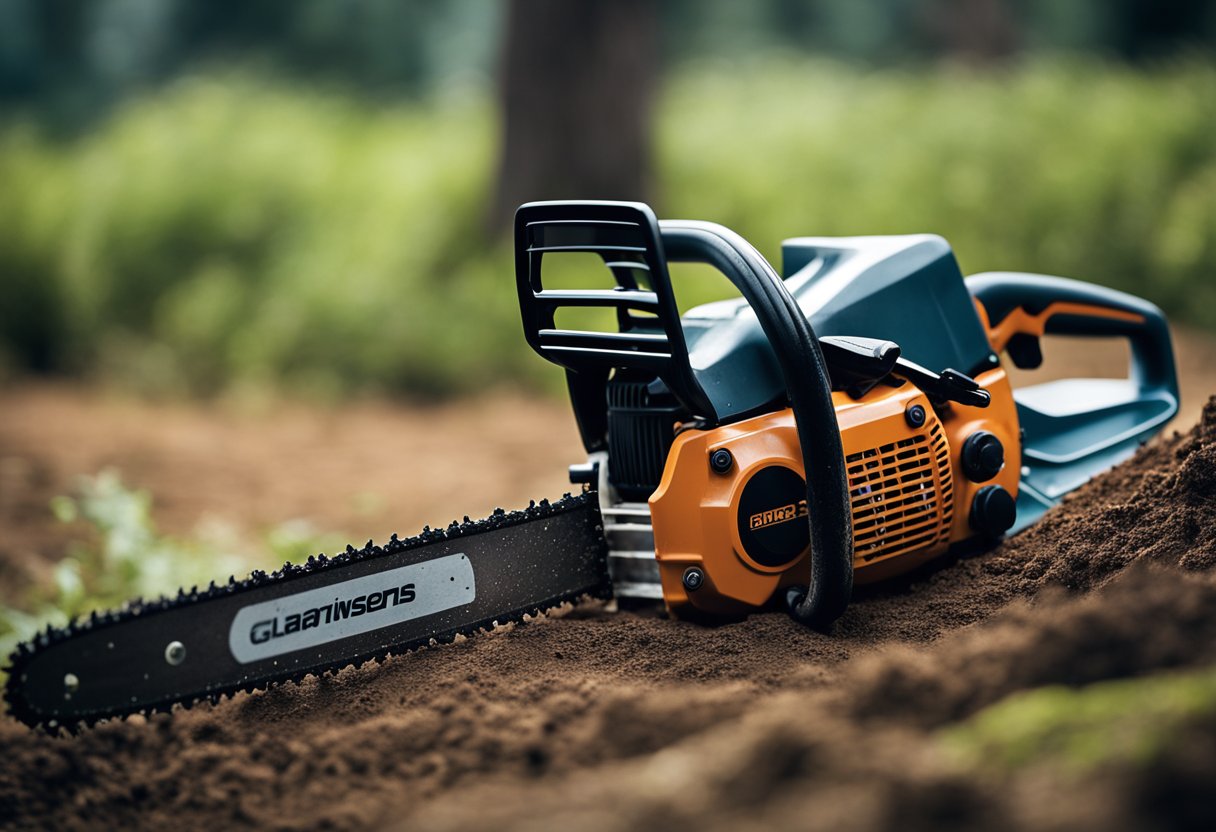I have researched the topic of why dirt dulls a chainsaw, and the answer is quite simple. Dirt contains abrasive materials like sand, rocks, and gravel, which can wear away the steel teeth on the chainsaw chain. As a result, the chainsaw becomes dull and less effective over time.
Understanding chainsaw basics is important to know why dirt dulls a chainsaw. Chainsaws have a chain of teeth that rotate at high speeds, and when they come into contact with dirt or other debris, those teeth can start to dull. Over time, this will make the chainsaw less effective and eventually cause it to break down completely.
Dealing with dull chainsaw issues can be frustrating and dangerous. It’s important to maintain a sharp chainsaw chain to avoid these issues. This can be achieved by keeping the chainsaw clean and free of dirt and debris, and regularly sharpening the chain. Regular maintenance and precautions can help prevent chainsaw issues and prolong the life of the chainsaw.
Key Takeaways
- Dirt dulls a chainsaw due to its abrasive nature and the presence of hard particles like sand, rocks, and gravel.
- Regular maintenance and precautions can help prevent chainsaw issues and prolong the life of the chainsaw.
- Keeping the chainsaw clean and free of dirt and debris, and regularly sharpening the chain are important steps to maintaining a sharp chainsaw chain.
Understanding Chainsaw Basics
https://www.youtube.com/watch?v=xlwb0IiUjnc&embed=true
As someone who has used chainsaws for years, I understand the importance of knowing how they work and how to maintain them. A chainsaw is a powerful tool that requires proper handling to prevent accidents and ensure longevity.
At its core, a chainsaw consists of an engine, a sprocket, a guide bar, and a chain. The engine powers the saw and drives the sprocket, which in turn rotates the chain around the guide bar. The chain consists of a series of teeth that cut through wood as they rotate around the bar.
The guide bar is an important component of the chainsaw, as it provides the surface against which the chain moves. It also helps to guide the chain and keep it in place. The bar is typically made of a durable material such as steel, and it can vary in length depending on the size of the chainsaw.
The chainsaw chain is made up of a series of chain links that are connected together. Each link consists of a drive link, a tie strap, and a cutting tooth. The drive link fits into the sprocket, while the cutting tooth is responsible for cutting through wood.
It’s important to note that the chainsaw chain is a consumable part that will eventually wear down and need to be replaced. Dirt and debris can accelerate this process by dulling the cutting teeth and causing the chain to stretch.
In summary, a chainsaw is a complex tool that requires proper maintenance to ensure optimal performance. Understanding its basic components, such as the engine, sprocket, guide bar, and chain, is crucial to using it safely and effectively.
Why Dirt Dulls a Chainsaw
https://www.youtube.com/watch?v=hg10hqQ2_QY&embed=true
As someone who has worked with chainsaws, I have come to learn that dirt is one of the biggest culprits of dulling chainsaw chains. Dirt is abrasive and contains hard particles like sand, rocks, and gravel that can easily wear away the steel teeth on your chain [1]. When dirt gets stuck between chain links, it can also cause your chain to stretch, leading to uneven cuts and a dull chainsaw chain [2].
The wear and tear caused by dirt can be quite significant, and it can affect the performance of your chainsaw blade. When dirt gets into the cutters of the chain, it can cause them to become dull, which can lead to a chain that is less effective at cutting through wood [1]. A sharp chain is essential for a chainsaw to work correctly, and dirt can quickly dull it, leading to a less efficient and less effective tool.
It’s important to keep your chainsaw chain out of the dirt to prolong its life, burn less fuel, and spare you wasted time and effort [1]. Cutting into dirt comes with the territory, but you can minimize the damage by cleaning your chainsaw chain regularly and replacing it when it becomes dull. By doing so, you’ll ensure that your chainsaw is always sharp and ready to tackle any job you throw at it.
Overall, dirt is a significant factor in dulling chainsaw chains, and it’s essential to take steps to prevent it from happening. With proper maintenance and care, you can ensure that your chainsaw stays sharp and effective for years to come.
[1] Cut The Timber
[2] Power Tools Savvy
Effects of Cutting Dirty Wood
https://www.youtube.com/watch?v=dJw9fpC-Sb4&embed=true
When cutting dirty wood, the dirt and debris can cause significant harm to the chainsaw chain. Dirt contains abrasive particles like sand and small stones that can act as sandpaper on the sharp edges of the chainsaw teeth, causing them to dull quickly. 1 Dirt can get compacted into the spaces between the teeth, affecting the blade’s cutting efficiency. 2
Cutting dirty wood can also cause the chain to stretch, leading to poor cutting performance and potential damage to the chainsaw. When dirt gets stuck between chain links, it can cause the chain to wear out faster, leading to excessive wear and tear on the chain links, sprocket, and other components of the chainsaw. 3
If you inspect the wood before cutting it, you will find that it’s embedded with granules of sand that can wreak havoc on your chain. Dirt can also cause the chain to heat up quickly, which can lead to damage to the chain and the saw. 1
Therefore, it’s essential to ensure that the wood you are cutting is as clean as possible. If you must cut dirty wood, ensure that you clean the chain regularly to prevent dirt buildup. You can also use a chainsaw chain oil to lubricate the chain, which can help reduce the impact of dirt on the chain. 4
In summary, cutting dirty wood can cause significant harm to your chainsaw chain and lead to poor cutting performance. It’s essential to ensure that the wood you are cutting is as clean as possible to prevent dirt buildup and damage to your chainsaw.
Dealing with Dull Chainsaw Issues
https://www.youtube.com/watch?v=4WewkSddxws&embed=true
When it comes to chainsaw maintenance, one of the most common issues that you will encounter is a dull chainsaw. A blunt chainsaw chain can cause a lot of problems, including overheating, increased fuel consumption, and poor cutting performance. In this section, I will share some tips on how to deal with dull chainsaw issues.
Sharpening the Chainsaw Chain
The most obvious solution to a dull chainsaw is to sharpen the chainsaw chain. You can either sharpen the chain yourself or take it to a professional. If you decide to sharpen the chain yourself, you will need a chainsaw file and a chainsaw file guide. You can find these tools at any hardware store or online. Make sure to follow the manufacturer’s instructions when sharpening the chainsaw chain.
Signs of a Blunt Chainsaw Chain
It is essential to know the signs of a blunt chainsaw chain to prevent further damage to your chainsaw. A blunt chainsaw chain will produce sawdust instead of wood chips, and it will take longer to cut through wood. You may also notice that the chainsaw is vibrating more than usual, and it is making a lot of noise.
Overheating
A dull chainsaw chain can cause your chainsaw to overheat. Overheating can damage the chainsaw, and it can also be dangerous. If you notice that your chainsaw is overheating, turn it off immediately and let it cool down. Once it has cooled down, check the chainsaw chain for any damage or wear.
Fuel Consumption
A dull chainsaw chain can also increase your fuel consumption. A blunt chain will require more power to cut through wood, which means that your chainsaw will use more fuel. If you notice that your chainsaw is using more fuel than usual, check the chainsaw chain for any damage or wear.
Bent Chainsaw Chain
A bent chainsaw chain can also cause your chainsaw to become blunt. If you notice that your chainsaw chain is bent, replace it immediately. A bent chainsaw chain can cause a lot of damage to your chainsaw, and it can also be dangerous.
In conclusion, dealing with dull chainsaw issues is essential to keep your chainsaw in good working condition. Sharpening the chainsaw chain, knowing the signs of a blunt chainsaw chain, preventing overheating, reducing fuel consumption, and replacing a bent chainsaw chain are some of the ways to deal with dull chainsaw issues.
The Role of Debris and Foreign Objects
As a chainsaw cuts through wood, it is exposed to various debris and foreign objects that can cause damage to the chain. Dirt, sand, rocks, and even metal objects can cause the chain to become dull.
One of the most common types of debris that can dull a chainsaw chain is dirt. Dirt contains hard particles such as sand, quartz, and silica silicates that can wear away the steel teeth on the chain. When dirt gets stuck between chain links, it can also cause the chain to stretch, which can lead to further damage.
Nails and other metal objects can also cause damage to a chainsaw chain. When a chainsaw comes into contact with a nail, it can cause the chain to become dull or even break. Similarly, cutting through ironwood or other dense materials can put a strain on the chain and cause it to become dull.
Bark is another common type of debris that can cause damage to a chainsaw chain. As a chainsaw cuts through bark, it can become clogged with sap and other sticky substances. This can cause the chain to become dull and make it more difficult to cut through wood.
In conclusion, debris and foreign objects play a significant role in dulling a chainsaw chain. Dirt, sand, rocks, metal objects, ironwood, and bark can all cause damage to the chain and make it less effective. It is important to be aware of these hazards and take steps to prevent them from causing damage to your chainsaw.
Maintenance and Precautions
As a chainsaw user, I know that dirt is one of the biggest enemies of a chainsaw chain. Dirt can quickly dull the chain and reduce its efficiency. In order to prevent this, it is important to take proper maintenance and precautions.
Firstly, it is important to keep the chainsaw and its components clean. After every use, I make sure to clean the chain, guide bar, and sprocket thoroughly. I use a soft-bristled brush to remove any dirt or debris that may have accumulated. This helps to prevent the dirt from getting stuck between the chain links and causing wear and tear.
Secondly, I make sure to lubricate the chain regularly. Lubrication helps to reduce friction and keep the chain running smoothly. I use a high-quality lubricant that is specifically designed for chainsaws. This not only helps to prolong the life of the chain but also reduces the risk of rusting.
Thirdly, I always make sure to cut above the ground level. Cutting on the ground can cause the chain to come into contact with dirt and other debris, which can quickly dull the chain. I always look for signposts or other markers to ensure that I am cutting at the right height.
Lastly, I make sure to check the chain regularly for signs of wear and tear. If I notice any signs of damage or dullness, I replace the chain immediately. This helps to prevent any further damage to the chainsaw and ensures that it remains efficient and safe to use.
By following these maintenance and precautionary measures, I am able to keep my chainsaw chain sharp and efficient for longer periods of time.
The Chainsaw Enthusiast and Homeowner
https://www.youtube.com/watch?v=7Fh3hLHrvkg&embed=true
As a chainsaw enthusiast and homeowner, I understand the importance of keeping my chainsaw in top condition. One of the most common problems that I face while using my chainsaw is the dulling of the chain due to dirt and debris.
Dirt is one of the biggest enemies of a chainsaw chain. When a chainsaw comes into contact with dirt, the abrasive particles in the dirt wear away the steel teeth on the chain, causing it to become dull. This can affect the performance of the chainsaw, making it less efficient and increasing the chances of kickback.
Kickback is a serious safety concern when using a chainsaw. Kickback occurs when the chainsaw blade hits an object and bounces back towards the user. This can cause serious injury or even death. A dull chainsaw chain increases the chances of kickback, making it even more important to keep the chain sharp and free from dirt and debris.
To avoid dirt and debris, it is important to use the chainsaw correctly. Cutting above the ground level can help prevent dirt from getting into the chain. It is also important to maintain a sharp chain. A dull chain not only increases the chances of kickback, but it also shortens the lifespan of the chainsaw.
As a homeowner, I use my chainsaw for a variety of jobs, from cutting firewood to building a treehouse for my kids. Keeping the chain sharp and free from dirt and debris not only ensures that the job is done efficiently, but it also increases the lifespan of the chainsaw, saving me money in the long run.
In summary, as a chainsaw enthusiast and homeowner, I understand the importance of keeping my chainsaw in top condition. Dirt and debris can dull the chainsaw chain, increasing the chances of kickback and shortening the lifespan of the chainsaw. By using the chainsaw correctly and maintaining a sharp chain, I can ensure that my chainsaw performs efficiently and safely for years to come.
Frequently Asked Questions
How can dirt damage a chainsaw?
Dirt can damage a chainsaw in a number of ways. One of the most common ways is by causing the chainsaw blade to become dull. Dirt particles, especially those that are hard and abrasive, can wear away the steel teeth on the chainsaw blade, making it less effective over time. Dirt can also cause the chainsaw blade to become clogged, which can lead to overheating and damage to the engine.
What are the effects of soil on chainsaw blades?
Soil can have a number of effects on chainsaw blades. One of the most common effects is that it can cause the chainsaw blade to become dull. Soil particles can wear away the steel teeth on the chainsaw blade, making it less effective over time. Soil can also cause the chainsaw blade to become clogged, which can lead to overheating and damage to the engine.
Can dirt cause chainsaw blades to become dull?
Yes, dirt can cause chainsaw blades to become dull. Dirt particles, especially those that are hard and abrasive, can wear away the steel teeth on the chainsaw blade, making it less effective over time. Dirt can also cause the chainsaw blade to become clogged, which can lead to overheating and damage to the engine.
What types of dirt are most damaging to chainsaws?
Any type of dirt can be damaging to chainsaws, but hard and abrasive dirt particles can be particularly damaging. Dirt that contains sand, rocks, or gravel can wear away the steel teeth on the chainsaw blade, making it less effective over time. Dirt that is highly polluted can also be damaging to chainsaws, as it can contain chemicals that can corrode the blade.
Are there any preventative measures to avoid dirt dulling a chainsaw?
Yes, there are several preventative measures that can be taken to avoid dirt dulling a chainsaw. One of the most important is to avoid cutting trees that are full of dirt. Another is to avoid using the chainsaw on the ground, as this can cause dirt to become trapped in the blade. It is also important to keep the chainsaw clean and well-maintained, as this can help to prevent dirt buildup.
How often should chainsaw blades be cleaned to prevent dirt buildup?
Chainsaw blades should be cleaned after every use to prevent dirt buildup. This can be done by wiping down the blade with a clean cloth or brush, or by using compressed air to blow away any dirt or debris that may be trapped in the blade. It is also important to keep the chainsaw well-maintained, as this can help to prevent dirt buildup and extend the life of the chainsaw.
Footnotes

Hi, I’m Sal Muller of Tooltrip.com. My DIY experience led me to understand essential power tools for home projects. Tooltrip.com guides enthusiasts and professionals in choosing right tools for any job. I provide concise top tool reviews for easier, efficient DIY.





